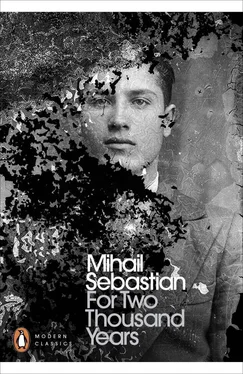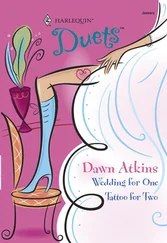‘Marin, go to bed! You must be sick.’
He stayed until late in the evening, when the third shift sounded, down at the oil wells. As I too was very tired, we went straight to the cabin, to eat what we could find.
‘Well,’ he finally said with a deep sigh, ‘I’ll tell you one thing, I’ll do anything, but I don’t touch my friends’ women. Anything but that.’
I didn’t understand a thing and waited for him to go on.
‘Look, this is what happened: last night I’d had a couple of drinks and I went out on to the veranda to cool down. I found your Marjorie out there. Her husband was playing cards. “Let’s take a walk,” I said. “Certainly,” says she. So off we went. When we passed by her house, she said, “Come in, I’m thirsty, I want to drink a glass of water.” I went in and, in the dark, I tried to kiss her, and she didn’t object. In the end we went to bed and she told me not to ruffle her dress. Then we went back to the club, and her husband was still playing cards.’
Marin Dronţu has gone quiet and is looking at me, awaiting a response, a sign. For a few moments I say nothing either, not knowing what to do. There are so many things to be done …
My first thought is to stand up, run down to the Duntons’ villa and ask Marjorie. Ridiculous. When it comes to women, Marin Dronţu never lies.
But I should inquire further, get him to tell me everything, right down to the details. I should stand up and pace about the cabin, I should rush over to young Dogany, I should tell Dronţu what a pig he is.
I raised my head.
‘Bravo, Marin. And is that all you’ve been fretting about for an entire day? You slept with her, so good for you.’
‘You mean, you’re not angry?’
‘Why should I be? What’s it to me? Is she family? My wife? Lover? It’s between the two of you. Come on, let’s eat now.’
I drank a bottle of wine and Marin sang a few sentimental songs.
‘What the hell, they’re all the same, the lot of them. Women.’
That’s my consolation.
*
The work goes on. The master’s visit has put things in order. But his interview with Rice went worse than I expected.
I’d counted on a five-minute argument. It lasted an hour. The master left the director’s office, slamming the door, and went straight to the oilfield, where he remained with us until evening, running from one corner to the other, scrutinizing everything. I could feel his bad humour, and everybody worked in silence, with their heads down. It was like a tacit act of solidarity with him. I think he understood that.
Old Ralph turned up, too, around four o’clock with a long-faced look of consternation. He hovered around Vieru, not knowing how to begin speaking again, but Vieru was determined not to lighten his penance. In the end, the old fellow had to bite the bullet: he took it all back, apologized in a roundabout way and vowed not to meddle any more.
That night the master slept here with us, in the cabin. We stayed up late talking, drinking wine and smoking, all three of us. You could hear brief rumblings from afar, which then echoed down the whole valley, as if every sound were broken into thousands of tiny splinters. It’s a well that’s been gushing for about two days at Romanian Star. Like the breathing of a caged animal, somewhere in the night.
*
Pierre Dogany came by the cabin yesterday evening to see me. I was surprised, as he’d never done this before.
Poor boy! He senses something has happened but doesn’t know exactly what, and doesn’t have the courage to imagine.
If I could be sure his suffering contained enough freedom of spirit, I’d tell him and, with a little intelligence, he would be consoled.
We went together to the Star well to see how it was working. There were a lot of flares, like some strange torchlight procession. Human shadows grew immense around us, into the distance, upon the hillsides.
He spoke of his approaching departure, and tried to seem indifferent.
‘Why are you really going? Do you think the university in Budapest is better than the one in Bucharest?’
‘I don’t know if it’s better. But it’s my university.’
‘I thought you were a Jew.’
‘I’m Hungarian. A Jew, of course, but also a Hungarian. My father opted for Romania. His business. He was born in Satu Mare, he wants to die in Satu Mare. He votes, pays his dues, reads the Bucharest newspapers. None of that interests me. It’s not part of me, I don’t understand it. I grew up with Endre Ady. I’m sticking with him. I’d feel stifled if I stayed here, in this atmosphere, with these people. And if it weren’t for my parents, who I have to see in the holidays, and especially if there wasn’t something else —’ he fell quiet, hesitating — ‘I think I’d stay there for good. You have to understand: it’s my memories, my language, my culture.’
‘A culture that, from what I’ve heard, doesn’t embrace you with the same enthusiasm with which you embrace it.’
‘I foresaw that objection. And I’m surprised you haven’t reminded me that Budapest University has a numerus clausus . Of course it’s not pleasant. It’s humiliating at times. But when you really love something, you love the good and the bad together. This will pass too, some day. You’d do the same in my place.’
We headed home, on the Ursu road. There was still a light on at the Duntons’, and Dogany suddenly fell quiet. He took his leave brusquely, with a quick goodbye. For a moment, I wanted to call after him. I’m not sure what I wanted to say to him. Something to make him feel less alone.
*
Marjorie came by the oilfield today. She was wearing a green knitted dress and a white scarf.
I was terribly busy, but took care to talk with her for a long time so that she wouldn’t think I was annoyed. She had leaned back against some support beams, arms hanging loosely at her sides, legs slightly bent, the soft shape of her knees protruding against her dress. She has fine, long bones. She spoke with great animation and seriousness, but I couldn’t understand what it was about. I tried to follow her or at least to seem focused, but my thoughts were elsewhere. Marin Dronţu approached us, but she continued speaking to me, completely unchanged, completely unsurprised, showing no awkwardness. He coughed a couple of times, shifted his weight from foot to foot, then went away, shrugging his shoulders in boredom.
‘She’s just showing off,’ he said to me later.
*
I wasn’t expecting the professor’s visit, and the telegram he sent me to announce his arrival was a real surprise.
‘At last, he’s given in,’ I said to myself. I’d asked him so often to come to Uioara, and he refused vehemently each time.
‘What you’re doing there is barbarous, criminal. It’s the most artificial thing that’s been done in Romania since 1848.’
Since I began work at the Rice concession, much opposition has subsided. Ghiţă Blidaru’s opposition alone has remained firm. Vieru doesn’t say anything, but I think that deep down this disapproval hurts him, and is all the harder for him to deal with as it’s purely intellectual in nature. If ‘Professor Ghiţă’ — as he calls him — were an engineer, I don’t think Vieru would care less about his objections. One set of figures can always be countered by others. But the professor’s hostility to the Uioara project does not concern technical or economic issues. He’s thinking of ‘the problem of the plum trees’, a perspective he would readily recognize as being at the very core of his thinking. ‘ Whenever the struggle is waged between life and an abstraction, I will be on the side of life, and against abstraction .’
The master despairs utterly before this unassailable position, as it transcribes the issue to a level and a scale of values with which he has no connection.
Читать дальше












